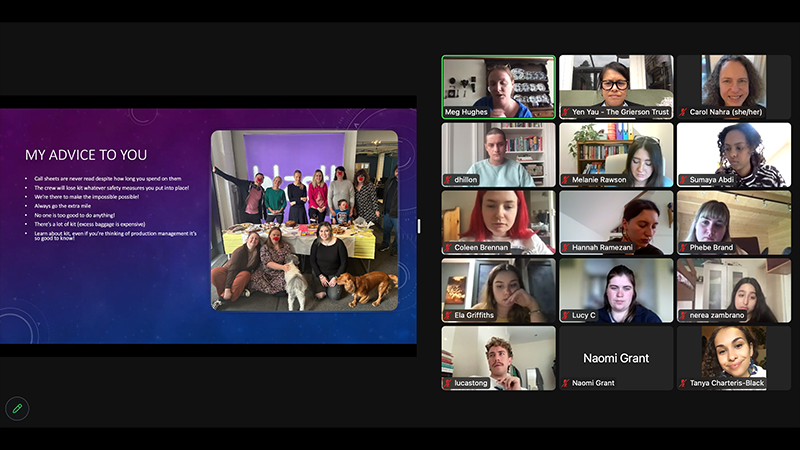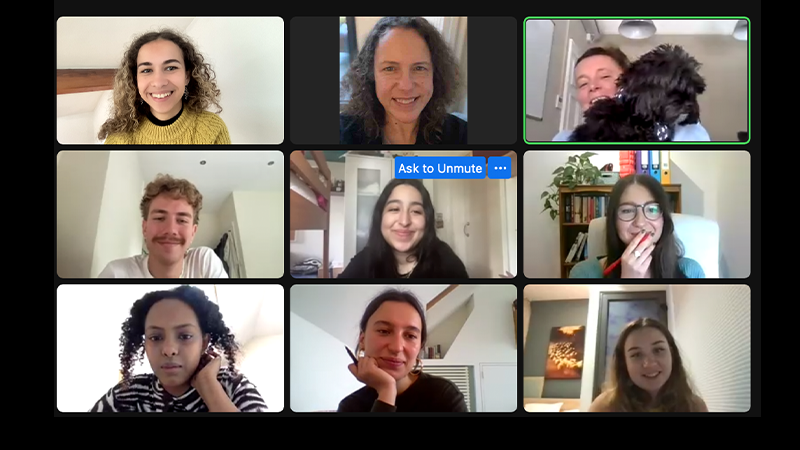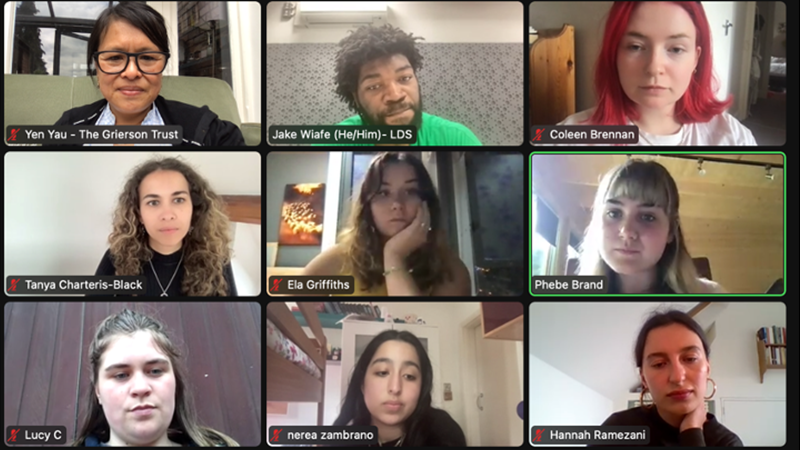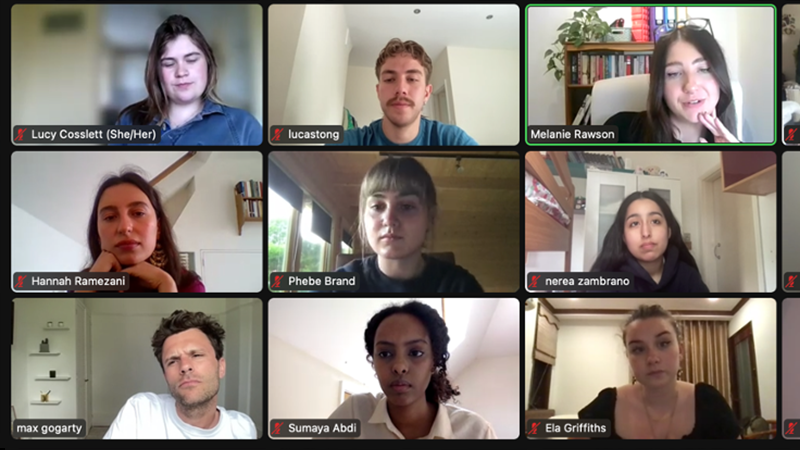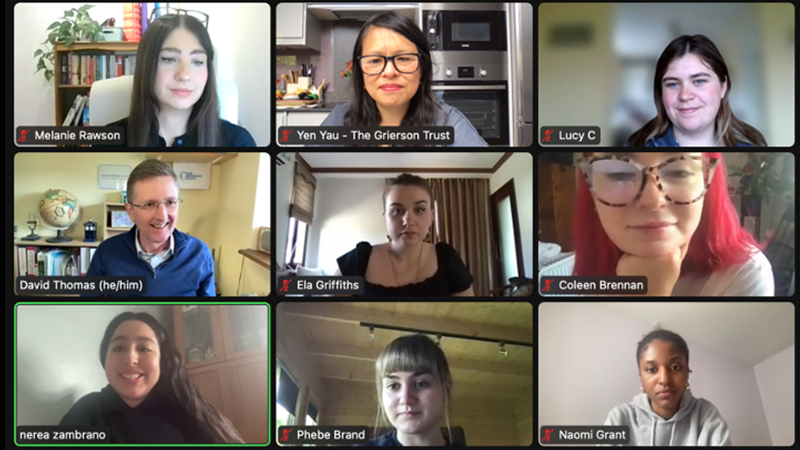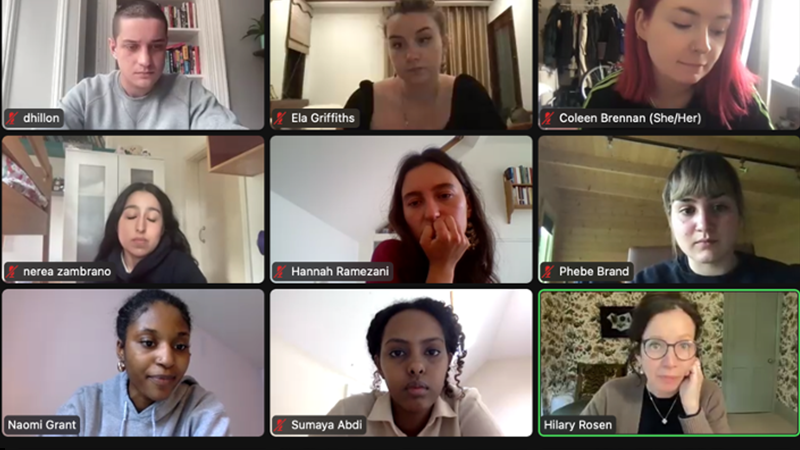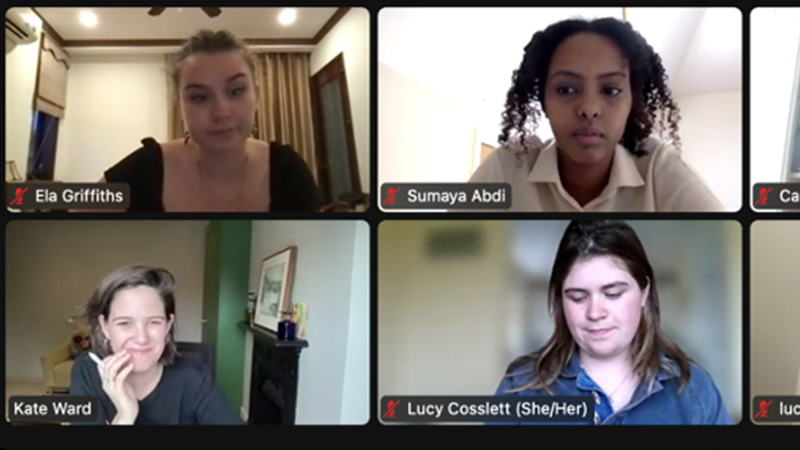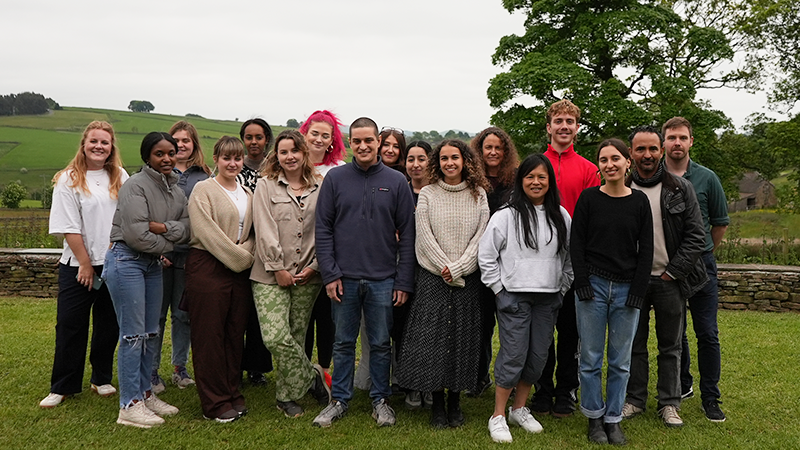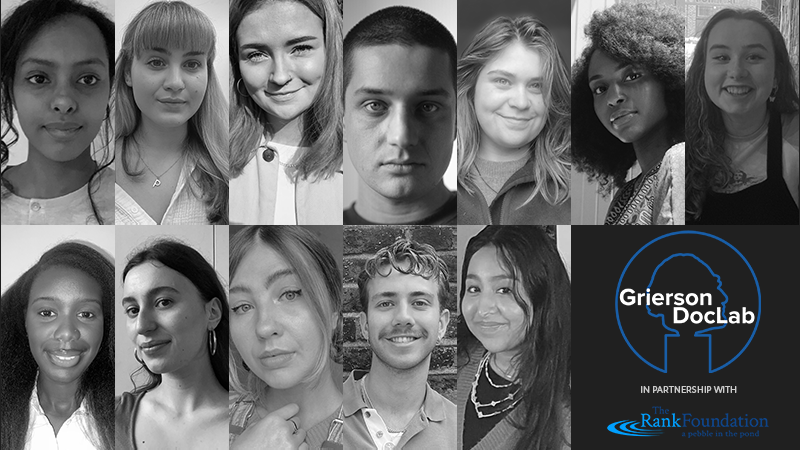July 06, 2023
Read all about the online training week from our 2023 Grierson DocLab group
Our latest cohort of Grierson DocLab trainees talk through the topics, workshops and speakers that their online training week covered
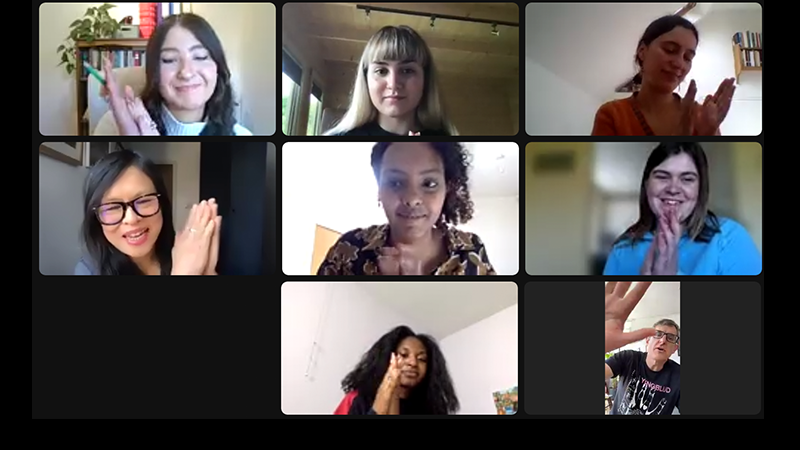
The group on their first day of online training on Zoom, with guest speaker, Louis Theroux.
Online Training Week
Monday 15 May
Ela Griffiths
Ahhh the first day of Grierson DocLab 2023 is here!
I had been working on a project exploring queer writing and creative spaces in Hanoi with the British Arts Council Wales, so I was fortunate enough to be zooming in from Vietnam. Being 6 hours ahead meant I was on the afternoon shift, starting 3pm with a 7/11 coffee in hand. I was slightly apprehensive about doing the training online, having had too many awkward silences during my Covid university experience at Manchester. Nevertheless, I was excited to meet my fellow DocLabbers and training instructors and to get stuck into all things documentaries.
We had a lovely warm welcome from Grierson Chair, Lorraine Heggessey, who gave us an interesting insight into her background in TV and some top tips. She is an absolute trailblazer in her field, and my nerdiness peaked when she mentioned she had introduced Dr. Who back to the BBC.
As we were going round the room setting some goals and expectations of what we’d like to get out of the scheme during the year, a mysterious grey screen popped up in the right-corner labelled LOUIS UK PHONE. This turned out to be the documentary icon and new chart-topping viral rapper, Louis Theroux. A moment where we all had to contain our excitement indeed. Louis was very generous with his time and shared some great wisdom on how to tell stories that keep people watching.
I chowed through some gyozas and edamame on our break and then got straight back into it with a discussion into the history of documentaries, looking at the UP series and John Grierson himself. We then went on to do some pitching exercises in smaller groups. Being a newbie to the industry, it was insightful to see how ideas and stories can be framed in different ways in the commissioning world. It was also lovely to just to be chatting and collaborating with other people who clearly loved documentaries just as much as me.
I really enjoyed the first day, and it definitely got my brain zinging with ideas.
Sumaya Abdi
During our afternoon session, we delved into the history, theory, and practice of documentary filmmaking. Carol provided a historical overview of the topic, highlighting John Grierson's role in coining the term "documentary" and his conceptualization of it as "the creative treatment of actuality."
Subsequently, we observed this creative treatment in practice as we viewed a segment from Bring Me Back to Life, a convention-defying film chronicling the experience of a comatose man undergoing treatment after a near-fatal accident. The camera assumes his sensory faculties, recording the voices of the hospital staff who tend to him and the family who cherish him. We are accompanied through the documentary by an omniscient narrator, who recounts the calamitous events not to the spectators, but to the man himself. The film manipulates perspective and time, using shots of the sky to simulate being in an ambulance, or juxtaposing past (through archival images) and present, to illustrate the contrast between his life before and after the accident. It was a captivating clip that ignited a spirited debate among us DocLabbers on what constitutes a documentary.
Next, Carol imparted us with a succinct overview of the UK broadcasting landscape, and how it diverges from her native country of the US. We learned about the origins of British public service broadcasting and how it works to protect against commercial pressure.
With only two weeks remaining before our final pitch at the residential, we confronted a formidable challenge: to refine our pitching skills. Carol devised an exercise to introduce us to the art of pitching. We were divided into pairs and assigned an existing format to pitch as new. I collaborated with Coleen and we were assigned the show Love is Blind, a reality programme where singles date without seeing each other until they get engaged. We decided to rebrand it as Invisible Attraction, emphasiszing the social experiment aspect than the drama. We presented our pitch to Carol and the rest of the group. Carol gave us some constructive feedback on how to enhance our pitching skills and stressed the importance of being confident and engaging when selling our ideas. I took note of her advice and resolved to apply it to my final pitch during the residential.
For our final task of the day, half of the group presented their pitch ideas for original documentaries, while Carol offered her expert opinion and suggestions. I was astonished by the creativity and diversity of their proposals, spanning from personal stories to global issues. I also felt inspired to fine-tune my idea for tomorrow morning, when it will be my turn to pitch.
Tuesday 16 May
Phebe Brand
After an exciting first day introducing us to the world of factual film and television, I was eager to dive into the rest of the training week headfirst.
On our second day, a schedule full of industry professionals, an introduction to pitching, and a deep dive into development significantly enriched our knowledge to prepare us for the coming days, weeks, and months.
Following initial discussions about the week’s viewings, the day opened with an opportunity to talk to Head of Factual, Spencer Kelly and Talent Executive, Dee Kahlon from The Garden. One of the major points of discussion over the course of the week centered around consent and ethics in factual programming, which this talk allowed us to delve into further. Spencer and Dee discussed the setup of fixed-rig productions and the ongoing process of researching and obtaining consent for shows such as 24 Hours in A&E and 24 Hours in Police Custody.
It was interesting to find out how the consent process worked within these shows, as I’ve always been interested in the presentation of crime in factual television, so I was excited to find out more about how ethics are considered when working with victims and perpetrators. The working environment at The Garden especially stood out to me, being described as a ‘greenhouse to nurture talent’, with a significant focus on trust, career development, and psychological well-being. Dee’s clear advice on how to stand out in the industry and the desirable traits for different roles was especially helpful, allowing me to understand my future position within the industry more confidently.
In the afternoon, we started with a brief discussion on finding work and navigating finances as a freelancer, before shifting focus to the pitching process. To prepare for the upcoming residential, we began to condense our personal documentary ideas into three questions:
- Why this?
- Why you?
- Why now?
To further the exploration into pitches and commissioning, we were joined by Grierson DocLab Alumni, Holly Lubran and Robbie Hunter, to find out more about working in development. It was particularly valuable to witness their instantaneous ability to come up with ideas from a single stimulus, rapidly creating different shows and films from one idea, and it was great to witness how sizzles and pitch presentations can tie the whole process together visually.
Overall, the Tuesday of the training week was a crucial step in exploring more of the logistics and daily processes involved in the factual industry, expanding my understanding of the varying roles within each department, fuelling my personal curiosity in storytelling ethics, as well as being of significant help in developing my own ideas.
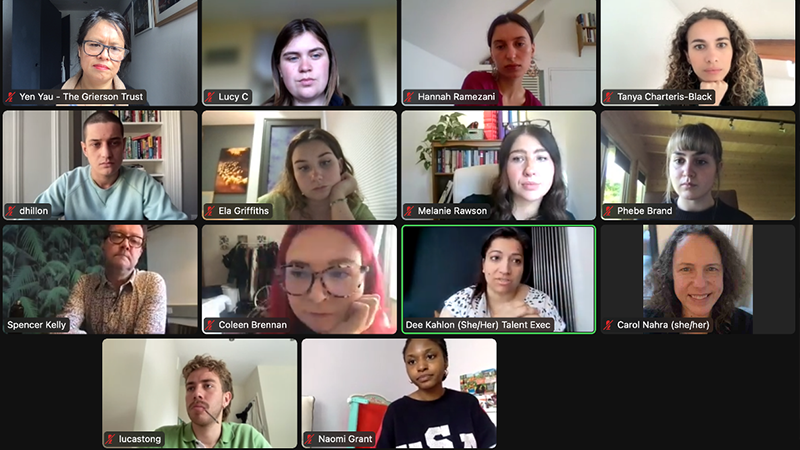
Wednesday 17 May
Hannah Ramezani
After a quick morning chat and a virtual cup of coffee with Yen, Carol, and Tanya, the third day begins with a talk about post-production workflows by Lucy Allen and Rowan Bray from Clear Cut Pictures. This is entirely new territory for me, and I’m initially doubtful when they promise we will understand the 43-step flow diagram containing words like ‘ingest’, ‘nearline’, and ‘advanced authoring format file’ by the end of the two-hour session. The talk moves at pace, and Lucy and Rowan are funny and generous. They provide a wealth of material and experience, and by the end of it, I really do understand all those words, and how the processes fit together.
We reconvene with Carol, our beloved head trainer. We have a discussion about unscripted reality over the past 30 years: how Big Brother represented a sea-change in audiences and commissioners for dramatic, long-form, cost-effective reality TV, how the 2003 Communications Act handed control over to production companies nimbler at distribution than broadcasters, and how it made way for the globalised, format-driven landscape we have today.
After lunch, we talk to Megan Hughes, a production manager at Blast! Films, and she gives us an insight into the hundreds of responsibilities her job might entail. Later in the week, a DocLab Alumna makes the case that Production Managers should be paid in line with Director/Producers, and it’s hard not to agree. We then have another session with Carol, and watch a few of the doc clips people have brought to class, covering topics from Jonah Hill’s therapist to Aileen Wuornos to the ethics of screening for Down’s Syndrome. These discussions are some of my favourite moments of the training - a kind of documentary show-and-tell.
Finally, we meet Jake Wiafe from Little Dot Studios , for a talk about demystifying digital content. He talked about the different ethical considerations on the internet as opposed to traditional broadcast media, how numbers do not necessarily translate to engagement, and the encroachment of AI – a topic we return to frequently throughout the week (that day, thought-to-video with stable diffusion is released, which terrifies me). Jake gives us some excellent professional advice, reminding us that we have a network already – each other! – and that taking every opportunity to uplift one another and form collectives can only be professionally beneficial, as well as personally. It’s a kind and appreciative note to end the day on. Then another three ruthless rounds of Werewolves, where Marion’s tireless commitment to the village is persistently doubted and she grows increasingly embittered.
Grierson DocLab 2023 Online Training Wednesday Speakers
Clear Cut Pictures, Jake Wiafe from Little Dot Studios and Meg Hughes from Blast! Films talk to the trainees.
Coleen Brennan
Day three of Grierson online training, and the week is in full swing! The full days on Zoom have been flying in unexpectedly, the days are packed full with such informative speakers and kind guests, which have made it a breeze!
Wednesday was looking to be a busy day full of amazing guest speakers. To begin our morning, we had an in-depth look at post-production from Clear Cut Pictures. Rowan Bray and Lucy Allen kindly put together a presentation that broke down all areas of post. It was really nice to see two women leading the discussion on post, as I have mainly worked with men in this department. One of my highlights of the week generally is the fact that Grierson is run by women, and the majority of our speakers were women. My main work experience in film has been in post-production, and despite having worked in this department, the class was SO helpful!
I really appreciate how much they made sure to simplify all the terms and jargon involved in the workflow, this is a barrier that can intimidate people coming into the industry, so it was really helpful. They talked deeply about the process all the way from acquisition to delivery. They broke down all the different roles involved, such as DIT and Edit Assist, and what their workflows were. One fact that I found interesting was that theatrical releases and broadcasts may need a different colour space when grading. I also learned the term ‘M+E’.
I found their talk so interesting and insightful, and it was so helpful having all the terms and processes broken down into small details. I love working in post and I really liked the team behind Clear Cut Pictures.
For the afternoon session, we heard from Meg Hughes at Blast! Films. Hearing Meg’s story was so interesting, it was nice to hear someone's progression coming from university since that is the position I am in at the moment. Meg is a Production Manager who worked her way up from her first runner job in university. She has worked on a wide range of projects and travelled all around Europe! We learned a lot about her duties, and one thing I found intriguing was just how much her role differs from shoot to shoot. No two days seem to be the same in Production Management! She explained how she never seems to switch off from work, as her job requires her to be reachable at all times. She seems to really thrive in this lifestyle, however I know I would struggle with it! Meg is so hard-working and her talk was super inspirational, regardless of what role you want to do.
Wednesday was another day filled with informative and helpful speakers, and I feel so much more equipped to enter the industry after it. This week has been invaluable to me, and I am feeling so grateful.
Thursday 18 May
Dhillon Clarke
Our fourth day of training started with a thought-provoking discussion on mental health within the documentary and factual TV industries. Hosted by Rebecca Day of Film in Mind, this was a first for the training scheme and provided an interesting insight into the issue. We learned about some troubling statistics from the Looking Glass survey (2019), which outlined some of the mental health challenges professionals have experienced whilst working in the industry. Rebecca then talked about a number of strategies that can be used to ensure that our own mental health is prioritised.
The group was invited to reflect on the key aspects of the industry that could negatively effect affect our mental wellbeing. These thoughts were then shared with the group, and Rebecca offered advice. Rebecca also highlighted the potential impact that engaging with distressing content can have on members of the crew. This is not limited to those on set, and can impact those working in all aspects of production. Following this, we took a break prior to the afternoon session, during which I particularly enjoyed watching a clip from Nick Broomfield’s Dark Days, which sparked a conversation about interview technique.
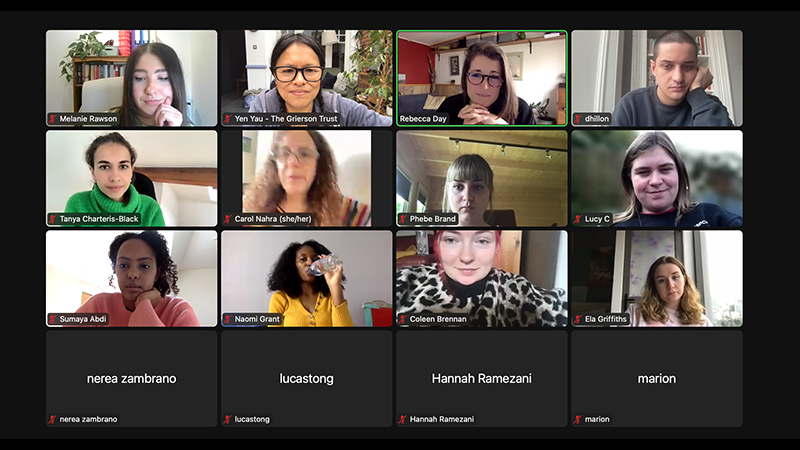
Melanie Rawson
Can you guess why German TV originally rejected Big Brother? Back in the late 90s, we hadn’t yet reached Davina screeching “Fancy another one?�” at a frenzied live audience. Before the hundreds of fans huddled outside the now-famous house, it was three men huddled together in an office in Holland who birthed the idea that changed the face of reality TV.
According to our assigned reading for today, Nicola Lees’ handbook, Greenlit: Developing Factual/Reality TV Ideas from Concept to Pitch, getting Big Brother from idea to reality (sorry for the pun) was no simple process. In one of many failed pitches, two execs from German TV channel Pro Sieben rejected the concept, as they believed that “the treatment of the housemates had Nazi undertones''. Lees explains how Big Brother changed throughout the development process and then goes on to unpack the whole spectrum of formats that make up factual TV.
This is where we kicked back off after lunch, returning in the afternoon to discuss Greenlit and then onto feedback from the research tasks we completed in our breakout rooms.
It was great to hear the other groups discuss their take on a range of different production companies, including RAW TV, Wonderhood and Lightbox. They analysed the wide range of content each company produces that make them unique.
Carol also drew our attention to the all-important ‘returning formats’ - think Wife Swap and Who Do You Think You Are? We learnt that shows like these are incredibly important for the production landscape, not least because they provide a stable cash flow which enables companies to produce their one-off films and passion projects.
Peppered in between our discussions, we also watched a few more of our chosen documentary clips. Among this afternoon’s selections was Chasing Coral, a documentary that follows divers and scientists around the world as they set out to explore why our coral reefs are disappearing. The closing shot of the clip looked back on a beautiful ocean scene. However, as the camera panned to focus on the diver, who had just discovered what was happening below the surface, a look of concern fell over his face, and this completely altered the atmosphere of the piece.
Next, it was my group’s turn to present our research on TV scheduling. We were all happily surprised to find that there is a huge proportion of factual content across our TV schedules (we calculated that 88% of last night’s programming fell into the factual category). This was made up of a broad range of content, everything from the 10 o’clock news to factual entertainment shows like Gogglebox. Thanks to the Greenlit reading, we were now able to match these varying programmes to classifications of genre, approach, and narrative guide.
Finally, we discussed The Black Cop, the 2022 BAFTA winner for Best Short Film, which was directed by previous Grierson trainee, Cherish Oteka. We all agreed this was an incredibly powerful film, taking note in particular of the tight shots during G’s interview, which focused the viewer on the complexity of emotion in his expressions. Another highlight were the sections of reconstruction from G’s past, which we felt brought his narration to life perfectly.
After a long day, I was filled with plenty of new knowledge and lots of great doc recommendations!
Friday 19 May
Lucy Cosslett
Day five started at 9am sharp with a strong coffee and a meeting with David Thomas of David Thomas Media. We introduced ourselves in true Grierson fashion and each shared how scared of taxes we all are. David reassured us that we wouldn’t be arrested for tax fraud, so that was a great start to the day! We learnt about how to finance as a freelancer by establishing our surviving versus thriving figure, when we’re responsible for our taxes and how to navigate them and received lifetime access to David’s training materials. Next up, we had a break. I lay on the couch defeated before my brother fueled me up with another coffee.
Then we met with Kate Ward, the managing Director of Factual for BBC Studios. We introduced ourselves and listened to Kate highlight how the longstanding collaboration between BBC Studios and Grierson has really benefited the BBC so that was really encouraging to hear. Kate went on to provide an overview of the extensive range of factual content that BBC Studios produces from their Documentary Unit, world- leading Natural History Unit, or Science Unit. We listened to Kate’s intriguing career path into the industry, which began with a history degree, and then with securing funding for development of future TV shows by selling programmes in the international market.
Persistence, light stalking, and MasterChef were my key takeaways from Kate’s career path. We learnt about how different production companies have their own distinctive characterisations which raised questions as to the type of content we’d like to make in the future and how character and emotional narrative never go out of fashion. I was really struck with how Kate told the story of her career. Lots of our speakers seem to be naturally gifted storytellers with witty remarks decorating the unfolding of their lives in the industry. After our chat with Kate, we took a wee break for some lunch, and I basked in the sun in the back garden.
We joined back in with Zoom shenanigans for a meeting with Max Gogarty, who is a Commissioning Editor of documentaries and factual entertainment for the BBC. It was so great to hear first-hand insights into what commissioners are looking for in the industry, a key point for moulding our upcoming documentary ideas that we’ll be pitching in Buxton at the residential portion of the training. Max also spoke about how Covid impacted viewing trends and then moved on to big, spooky questions about AI and the future of TV. I wondered if my future career was under threat by AI and decided it was best to secure my first TV job before I tackled that.
We finished off the day with a meeting with Hilary Rosen. Hilary is the Director of Commissioning for UKTV, a broadcaster that occupies a digital space and makes a wide range of scripted and unscripted content across multiple platforms. Hilary shared that she had worked in the House of Commons and as a journalist at the BBC before leaving for more creative freedom at an independent production company. Hilary advised us to absorb everything we could from our work experiences, ask lots of questions, and asserted that passion was the most important thing in establishing a career in this industry. We gave Hilary a round of applause and said our goodbyes as we were transported out of the virtual world and back into our houses in time for a BBQ and a glass of wine.
Lucas Tong
The week has built in energy, a crescendo felt imminent as my cohort of fellow documentary obsessives spring onto screen one by one. It is the penultimate day of our online training week; by this point we have charged through the documentary world’s multitudes - formats and post-production, interview techniques and development research, production management and digital content, ethical practices and pitching approaches. With each new splash of industry colour Carol and Yen add to our industry palettes. Each day we manage to illustrate discussions more vivid and varied than the ones before. Our opinions now paint a conversational landscape more nuanced and vibrant than our introductory discussions on day one.
Please keep reading. I promise that is the end of the painting metaphors. I am excited to spend another day talking docs!
The first session, led by David Thomas delved into the precise yet unpredictable art of being a freelancer and how to manage this. We covered invoicing, taxes, expense management and budgeting amongst other things. Next up was Kate Ward, Managing Director at BBC Studios who gave us an in-depth overview of commercial operations and the huge variety of clients they service.
We also briefly discussed the BBC's new investigative podcast - Believe in Magic (carefully avoiding spoilers as I am an episode behind Kate at this time). If you haven’t listened, it’s well worth a go - a fascinating look into a complex and harrowing case of Munchausen by Proxy. It also makes for great pre-listening to set the scene for another must-consume investigative piece that’s just out on Netflix - Take Care of Maya. Next, on the other end of the BBC spectrum, we heard from Max Gogarty, Commissioning Editor at the BBC. He discussed revitalising BBC Three and what commissioners are looking out for in all things factual.
Friday Speakers
David Thomas from David Thomas Media, Hilary Rosen from UKTV, Kate Ward from BBC Studios and Max Gogarty from the BBC talk to the Grierson DocLab 2023 trainees.
Saturday 20 May
Nerea Zambrano
Later start today… so I will admit I had a bit of a lie-in, but not too much. I wanted to keep the momentum of the early-bird version of me this week and get some reading done for my final university assignment - the unfiltered reality of being in final year! The week has flown by, and I have pages upon pages of notes, ready to add a few more today.
The day started with Yen going over a couple of presentations on mentoring, CV's and cover letters, setting us up for what’s next after the online training week. It got us thinking about what SMART goals we want to work on during the mentorship - realistic ones (she noted that getting a BBC Three commission is obviously a bit less so!) Of course, they have to be ones we can work on and that depend on that individual's work. But however more realistic it may seem, I wouldn’t have thought I’d be pitching and presenting a doc idea in the next couple of weeks, so that’ll be a personal goal ticked off the list. I wrote down examples of past SMART goals for inspiration, and was left to reflect on what I needed to work on.
12pm. Time for a short break! In what has become a ritual, I prepared myself an Earl Grey cuppa and kept my Italian Duolingo streak going. Side note: Apparently, when Italy won Eurovision the number of people starting the Italian course on Duolingo increased by 56%. I'm a big Eurovision fan and was one of those rushing to sign up, hoping to visit the future host city. Though this time I am actually going, I am planning to use some of the time to work on a family memoir idea that I started for a university assignment, so I am more motivated this time around!
With the lesson over, I clicked back onto the Zoom window. Next was the alumni session, with Jyoti, Eloise, and Sam sharing their experiences in factual TV. It never stops being fascinating how many widely different paths are out there, with each job varying according to the project. Jyoti is working on a doc which involves her screen recording the social messages the production is including. Now that’s a super niche skill! They gave us the unfiltered, not-so-glamorous bits of working in TV, but the advice they had, and the potential future relatability factor, made it a bit less daunting.
Last session for the day - and week - was a roundup of the week, starting with a Menti, one of the protagonists of this online training. From all the reflection prompts, I remember writing Yen’s reminder that “it’s not a sprint, it’s a marathon,” in what felt like a wise Yoda moment. Looking back on the three words that summarised our feelings in the first Menti of the week, there were some feelings like ‘nervousness’ that were still the same, but now words like ‘anticipation’ and ‘prepared’ were in the mix.
Next on the DocLab schedule is the in-person training, and prior to that for me, ticking off some documentaries from the longest watchlist ever, compiled from recommendation after recommendation I scribbled down throughout the week.
Next stop, Buxton!
Naomi Grant
Saturday was the final day of the training. The week was jam packed with useful industry tips and information! Although I did really enjoy the week thus far, I was relieved when Yen cut the Saturday schedule a bit shorter. This enabled us to have ample alone time to consolidate all the new information (that and it was hot outside!) We spent the day reflecting on the sessions we found most useful and what the next steps of the programme looked like. Ending the week with an action plan brought things into perspective, because although we were hearing from industry professionals is extremely aspirational, we are far away from them in our journey, yet making incremental steps from a mapped-out plan should draw us closer.
I found so many things during the week useful but I mostly enjoyed learning documentary theory and the ways in which people emotionally engage with documentary. It was also really intriguing to watch everyone’s documentary picks and to hear why it resonated with them. Before the training I used to just watch documentaries based on my own personal interest, but that activity definitely broadened my perspective and now I try to consume as much TV as humanly possible!
At the end of each session during the week, we did take part in a short form of anonymous reflection but in Saturday’s session we were able to speak and connect with each other as peers, whilst also receiving feedback from Yen and Carol. This day filled with honest connection, created the perfect grounds for our in-person meeting just a month later where we were able to put Zoom names to a face!

